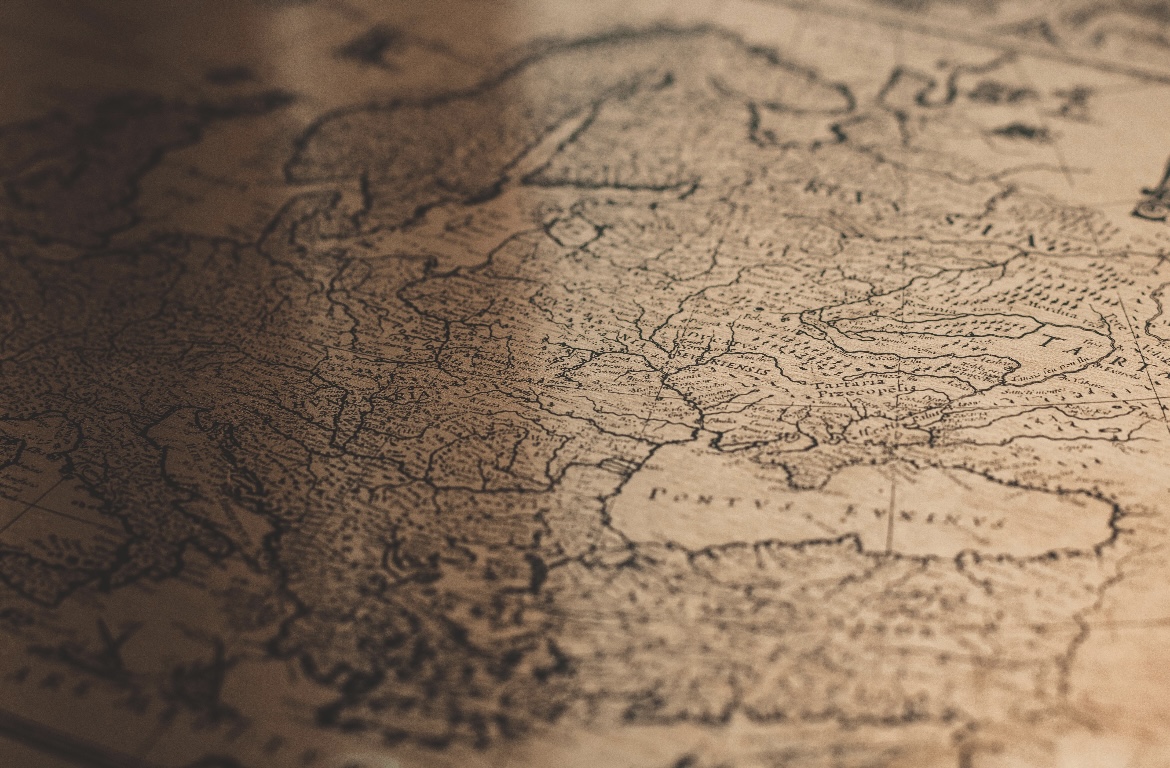By Karin
What is Eurocentrism? Are postcolonial and decolonial perspectives generated in European academia generally free from it? How may we move beyond the disproportionate attention given to Europe or ‘the West’?
Eurocentrism and Academia: A belief in divine punishment?
In an earlier blog post from 12 November 2024, called ‘Race’ and ‘The West’: Have these terms become mythologies?, I discussed a podcast episode called Traduire la race sans la trahir . In this same episode, an occurrence in the French parliament in 2010 is mentioned, in which the French Interior Minister denounced a political group deeming violence acceptable. A member of this political group responded by citing French writer Aimé Césaire saying World War II was a divine vengeance for European colonialism (minute 19:30). His statement invites us to believe that there is, not only such a thing as collective legal responsibility (other than on a state level), but also that this collective legal responsibility adheres to ethnic groups and travels across generations. In reality, of course, international law is based on individual criminal responsibility.
In Writing Beyond Race, author Bell Hooks claims that when some ‘black’ people embrace the notion that the ‘white’ world is an all-powerful constant enemy, this is an aspect of white supremacy thinking that leads to self-destructive behaviors (Hooks, 2013, p. 188). Similar destructiveness may arise in all types of contexts in which severe collective and individual trauma has been inflicted. Concerning Césaire’s comment about Europe deserving World War II, let us consider the following: 1) Many countries in Europe affected by World War II never colonized other countries. 2) Most victims of World War II were not born in countries that had engaged in significant colonialist projects and were not even European (outside the Soviet Union). 3) Very few, if any, of the people who died in World War II were the same actual individuals who had carried out atrocities during European colonialism. What would Hooks have thought about Césaire’s statement? That it was a destructive ghost of his mind?
Césaire’s statement does not even follow the ancient ‘an eye for an eye’ logic, more like ‘an eye for someone else’s eye, taken out by someone else’. Ideas of divine punishment may remind us of the tendency in human psychology for victim blaming. Humans need to feel safe and often imagine that when bad things happen to others, it is because they deserve it. Victim blaming allows people to believe that, as long as they themselves behave well, they do not risk the same fate as victims of wars, crimes, diseases and other forms of suffering. The article ‘The Psychology of Victim Blaming’ by Kayleigh Roberts, published in The Atlantic is one of many texts on this subject. The problem is that victim blaming may also make it easier for people to accept atrocities done to innocent people. After all, did they not deserve it?
Eurocentrism and Academia: Where are the others?
Is the discussion of only European colonialism in decolonial discourse related to a secret belief in ‘bad karma’ for Europe? I do not know. What I do know is that it seems Eurocentric. Because decoloniality is not merely decolonization from European colonizers specifically, it is also recognizing ongoing structures of oppression and recovering cultures and traditions that dominant powers have marginalized, whoever those dominant powers may be. In What is Development and Can We Decolonise it? Some Ontological and Epistemological Reflections, author Lata Narayanaswamy discusses historic mechanisms for land expropriation and universalizing (erasure of culture) and only mentions ‘European Empires’ as having engaged in such mechanisms (Narayanaswamy, 2024, p. 228). Several other empires would likely be offended at being left out in this manner. Russia, for example, is not included in the ‘European Empires’, even though half of Russia belongs to Europe. Ironically, Europeans not understanding nor appreciating the importance and sophistication of Russian culture – and of the Russian Empire, is one of the major grievances Russians have had historically. Yes, believe it or not, some countries are proud of their conquests. Russian author Fyodor Dostoyevsky lamented, in A Writer’s Diary, that ‘Europe had no understanding of Russia, that it did not recognize Russia as a European Power with a unique contribution to make to the European scene. Dostoyevsky was only one of many influential Russians who criticized Europeans for their condescendence and refusal to see Russia as an equal contributor to civilization. Is it still happening today? Well, just how Eurocentric do you have to be to create a European bad guys’ club and exclude Russia even from that one?
There are events in history that had nothing to do with Europeans and often they are not well-known known among Europeans, as well as non-Europeans who may have read mainly European history books. For example, authors Altik, Kothari, Leach and Saad-Filho discuss reparations, especially to African countries that are often considered the most exploited throughout history (Altik, Kothari, Leach & Saad-Filho 2024, p. 245). It would be hard to argue this is not a move towards more justice. However, we should also acknowledge less widely known wrongs. For example, France colonized Algeria starting in the 19th century and before that, the ancestors of those in power in Algeria at the time of French colonization, attacked and conquered that same territory and engaged in cultural, linguistic and religious erasure against the people already living there. Algerian authorities also later ethnically cleansed a part of its population and seized all the assets and belongings of people whose ancestors had lived in Algeria for hundreds or even thousands of years. Many of these people sought refuge in France in the 1960’s. This is something Algerian authorities rarely mention today and, when they do, it is often described as righteous collective punishment. Where have we seen this before? Could it be that ALL majority peoples have a tendency to tell mainly THEIR version of the story?
Eurocentrism and Academia: Can decolonial ideas become less Eurocentric?
In Decolonizing Knowledge Orders, Research Methodology and the Academia: An Introduction, intended to help social science teachers design a decolonial curriculum, authors Bendix, Mueller and Ziai argue productions in sociology and history often ‘ignore the constitutive role of colonialism in the making of Western modernity’ (Bendix, Mueller & Ziai, 2020, p. 8). No other colonialism than European colonialism and no other modernity than ‘Western’ modernity is mentioned. The authors Burrell and Davies further discuss, in the same publication, how Eurocentric discourses have constructed a view of the world in which non-European regions are considered ‘peripheral’ (Burrell & Davies, 2020, p. 144).
How ironic is it not that European scholars Burrell and Davies, who themselves seem to take into account almost exclusively historical events involving Europeans in their writing, state that Europe is wrongly being considered the center of everything? To their defense, perhaps we should expect that European scholars are Eurocentric, that African scholars are Africa-centric, that Asian scholars are Asia-centric, etc. If scholars on each continent focused more on their respective regional matters and considered other continents as ‘peripheral’, it would be rather normal after all.
Eurocentrism and Academia: Taking it further
Why should European acts and history count more? There is no need to focus disproportionately on them, not even in the negative. There is no ‘blame game’, that is not what this is about. It is about achieving analyses that are as accurate as possible to help us understand the world and inform public policy in a useful manner. If we look only at some of the events in the world and not at others, it makes our academic work less efficient.
According to ChatGPT, Russian and Chinese territorial conquests, with its subsequent cultural and linguistic influences, have had roughly as much impact on the world as British and Spanish colonialism (OpenAI, 2024, 1). Russia and China remain active imperial powers up until today. Moreover, Arab conquests, that also imposed culture, language and religion, have had a deeper and more transformative impact on the world than, for example, French colonialism (OpenAI, 2024, 2). Although these ChatGPT results merit a more detailed analysis, the following question needs to be asked: why present only a part of history in decolonial discourse? No one is even asking for that as far as I can see. Certainly not the countries, regions or empires who are proud of the influence they have had in the world so far. Nor the groups affected by marginalization. I would love to hear your thoughts on this, please comment below!
References:
Altik, Henrice; Kothari, Uma; Leach, Melissa & Saad-Filho, Alfredo (2024) ‘EADI Roundtable: Recasting Development Studies in Times of Multiple Crises’ in Challenging Global Development-Towards Decoloniality and Justice, pp. 237-260, Cham: Palgrave Macmillan: https://link.springer.com/book/10.1007/978-3-031-30308-1
Bendix, Daniel; Mueller, Franziska & Ziai, Aram (eds.) (2020): ‘Decolonizing Knowledge Orders, Research Methodology and the Academia: An Introduction’ in Beyond the Master’s Tools? Decolonizing Knowledge Orders, Research Methods and Teaching, pp. 1-15, Lanham, MA: Rowman & Littlefield: https://rowman.com/ISBN/9781786613608/Beyond-the-Master’s-Tools-Decolonizing-Knowledge-Orders-Research-Methods-and-Teaching
Britannica (November 15, 2024 updated) From the Arab conquest to 1830: https://www.britannica.com/place/North-Africa/From-the-Arab-conquest-to-1830
Burrell, Kathy & Davies, Andrew (2020) ‘They Call It “White Guilt: The Module” ’: Reflections on Teaching Postcolonial and Decolonial Geographies’ in Beyond the Master’s Tools? Decolonizing Knowledge Orders, Research Methods and Teaching, pp. 143-162, Lanham, MA: Rowman & Littlefield: https://rowman.com/ISBN/9781786613608/Beyond-the-Master’s-Tools-Decolonizing-Knowledge-Orders-Research-Methods-and-Teaching
Development Disrupter (November 12, 2024) ‘Race’ and ‘the West’: Have these terms become mythologies? (Blog Post) Communication for Development, University of Malmö: https://wpmu.mau.se/msm24group6/2024/11/12/race-and-the-west-have-these-terms-become-mythologies/
Diallo, Rokhaya, Ly, Grace & Soumahoro, Maboula (Hosts) (July 25, 2024) ‘Traduire la race sans la trahir’, no. 116 in Season 5 (Audio podcast episode) Kiffe ta race https://youtu.be/7y-7qTP0iSs?si=BOgtKuPKaQp43dJX
Dostoevsky, Fyodor (1873-1881) ‘A Writer’s Diary’ in The Citizen and other publications, Internet Archive: https://archive.org/details/the-diary-of-a-writer/The-Diary-Of-A-Writer/page/174/mode/2up
Hooks, Bell (2013): Writing Beyond Race, New York, Routledge: https://www.routledge.com/Writing-Beyond-Race-Living-Theory-and-Practice/hooks/p/book/9780415539159?srsltid=AfmBOopkHh2q0qlXjpUIJDil_vwmPRCKki6KBJTSixmtbDlR_q_cUib7
ICRC (The Red Cross) Rule no. 102, Individual Criminal Responsibility: https://ihl-databases.icrc.org/en/customary-ihl/v1/rule102
Narayanaswamy Lata (2024): ‘What is Development and Can We Decolonise it? Some Ontological and Epistemological Reflections’ in Challenging Global Development-Towards Decoloniality and Justice, pp. 225-235, Cham: Palgrave Macmillan: https://link.springer.com/book/10.1007/978-3-031-30308-1
OpenAI (2024) 1. Response to question comparing influence on regional and world orders of China and Russia imperialism versus British and Spanish colonialism. Available at https://chat.openai.com (Accessed: 21/11/2024).
OpenAI (2024) 2. Response to question comparing the influence on societies of Arab expansion with that of French colonialism. Available at https://chat.openai.com (Accessed: 21/11/2024).
Oxford Learner’s Dictionary, Victim Blaming: https://www.oxfordlearnersdictionaries.com/definition/english/victim-blaming
Roberts, Kayleigh (October 5, 2016) ‘The Psychology of Victim Blaming’ in The Atlantic: https://www.theatlantic.com/science/archive/2016/10/the-psychology-of-victim-blaming/502661/

